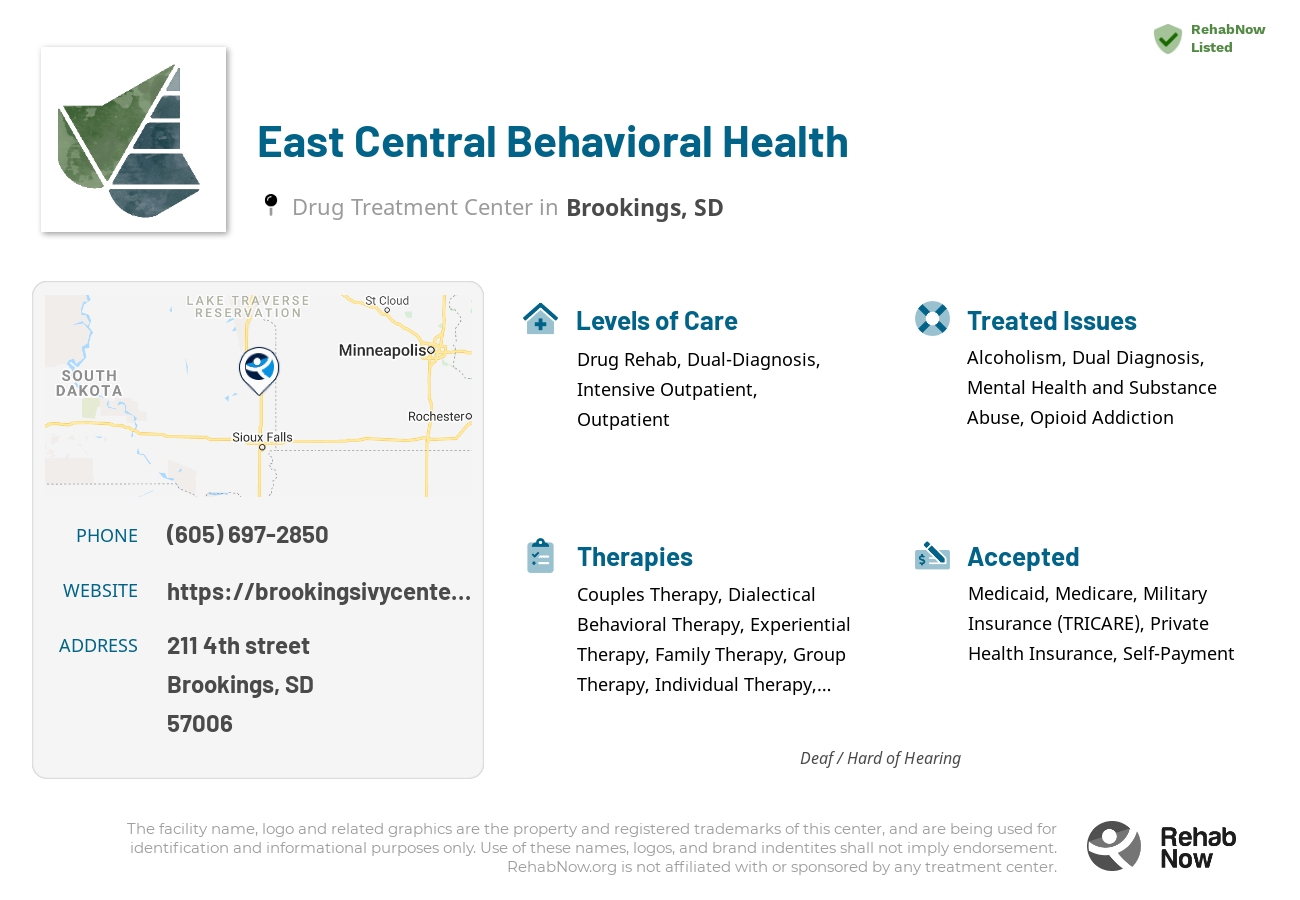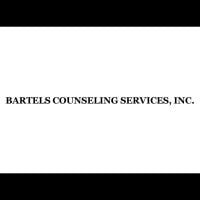East Central Behavioral Health
Drug Rehab Center in Brookings, South Dakota
East Central Behavioral Health provides high-quality addiction and substance abuse treatment in a supportive and safe environment using a comprehensive, evidence-based approach, including individual and group therapies, medication management, relapse prevention planning, aftercare planning, and individualized case management services.
About East Central Behavioral Health in South Dakota
East Central Behavioral Health, located in Brookings, South Dakota, is a facility dedicated to providing high quality addiction and substance abuse treatment in a supportive and safe environment. The facility offers a variety of programs, from partial hospitalization to intensive outpatient treatment, to help individuals and families start their journey of recovery. They provide a comprehensive, holistic approach to treating addiction with a combination of evidence-based practices, such as cognitive-behavioral therapy, drug and alcohol education, life skill training, and more. East Central Behavioral Health also provides medication management, relapse prevention planning, aftercare planning, and individualized case management services to ensure their patients achieve long-term recovery.
East Central Behavioral Health specializes in addiction and substance abuse treatment and provides a wide range of individual and group therapies to help individuals overcome their addiction. They offer specialized programs for adolescents, adults, and seniors, and provide comprehensive mental health services to help individuals and families manage the psychological aspects of addiction. Their evidence-based practices are designed to help individuals identify and unravel the underlying causes of their addiction and to learn the skills needed to live a substance-free life. Additionally, East Central Behavioral Health offers a family program to help family members understand and cope with a loved one's addiction while also providing support and guidance.
East Central Behavioral Health is an accredited facility and is licensed by the The Department of Social Services and the Department of Human Services. They have been accredited by the Joint Commission on Accreditation of Healthcare Organizations and are certified by the National Committee for Quality Assurance. East Central Behavioral Health ensures their facilities are staffed by experienced, licensed professionals, including psychiatrists, psychologists, social workers, and counselors. Their dedicated team of professionals uses a variety of evidence-based practices, such as cognitive-behavioral therapy and motivational interviewing, to provide a comprehensive and personalized approach to addiction treatment.
Genders
Ages
Modality
Additional
Conditions and Issues Treated
Opioid addiction is when someone becomes addicted to opioids. This can happen quickly due to any opioid use. Opioid withdrawal can be uncomfortable and lead the user to continue using even if they want to quit. It’s best to receive inpatient treatment for detoxification.
Even if a person doesn’t need inpatient treatment, it’s recommended to start rehabilitation or at least some kind of outpatient treatment. This is because the withdrawal symptoms from opioids can be uncomfortable and unpleasant, to the point that a person could end up using again or worse.
Detoxification should be done to break the physical addiction of opioids. This can be done with opioid replacement therapy, medication-assisted therapy, or a more traditional detoxification program. Intensive outpatient treatment is a form of addiction care that allows patients to continue living at home while undergoing treatment. This type of care is appropriate for patients who have been treated in residential treatment programs. Intensive outpatient programs include regular visits to the facility providing therapy, and patients gradually return to their routine life. IOP benefits most when patients have a supportive family member or friend to help them recover.
The first step to getting into an intensive outpatient program is to attend a detoxification facility. Detoxification facilities are designed to remove substances from the body safely. The patient will attend sessions designed to help them understand their addiction and its impact on their lives. While in an intensive outpatient program, therapy sessions are scheduled three to five times per week, with the patient attending no more than two sessions in one day.
Dual Diagnosis therapy is considered more successful than traditional rehab methods because it treats the addiction and the underlying mental health disorder simultaneously. This comprehensive approach gives Brookings, SD patients the best chance for long-term recovery. If the patient does not receive treatment for both conditions, they are more likely to relapse.
Levels of Care Offered
This center offers a variety of custom treatment tailored to individual recovery. Currently available are Drug Rehab, Dual-Diagnosis, Intensive Outpatient, Outpatient, with additional therapies available as listed below.
An intensive outpatient treatment program, or IOP, is set up for those struggling with an addiction to begin the recovery process. However, the patient will not live at the facility during treatment.
IOP involves patients coming in and out of a medical office building regularly to receive therapy and other services while continuing their life outside of these visits.
IOP is a step up from drug detoxification or alcohol detox. However, it’s still considered a phase of recovery rather than the ultimate goal. There are many rehabs and treatment facilities available to patients in need of IOP.
Outpatient treatment consists of counseling and therapy sessions. The outpatient treatment process begins with the addict’s initial detox period, lasting about ten days. Outpatient treatment is used for those who are at moderate risk for “slipping back” into the addiction. It is also used for those who are not currently experiencing any side effects from withdrawal, can handle social pressure, have a stable living environment, and have a good support system.
Therapies & Programs
Individual Therapy is a crucial component of addiction recovery. Therapists work with patients to identify the root of their addiction and figure out how to better handle the issues that led to them using drugs. Individual Therapy is one on one sessions where people meet with their therapist. Individual therapy provides a safe space for people to open up and discuss personal and sensitive topics which they may not feel comfortable discussing in a group setting.
In this type of therapy, therapists can develop specific solutions for each patient, which helps speed up their recovery process. In addiction recovery, therapy is a crucial part. It allows patients to go deep into their core issues and discover how those problems can be better handled now. Therapy can be performed in individual sessions as well as group settings. In individual therapy for addiction, the patient meets with the therapist one-on-one to focus on the underlying issues of addiction and come up with solutions to prevent future abuse.
Addiction can take a heavy toll on relationships, damage the trust and intimacy that was once there. Couples therapy at East Central Behavioral Health helps to rebuild the trust and intimacy that has been damaged. An intimate relationship with a drug addict is not healthy for children or anyone in the family. Therapist help to rebalance family roles and create a healthier environment after rehab in Brookings, SD.
Family therapy is a crucial part of drug treatment and getting sober. It is one of the most effective ways to help addicts stay on the path to long-term sobriety. One of the most important parts of family therapy is the relapse prevention plan. During treatment, therapists and doctors will often sit down with the addict and their family to develop a plan if the addict ever feels like they want to use again. This plan should involve steps the addict and family can take together to prevent them from relapsing in the future.
An addict’s family can play a vital part in helping them to avoid relapse because they can spot the warning signs and help them get back on track before it becomes too much of a problem. Family therapy is one of the most effective ways to help addicts stay on the path to long-term sobriety.
Group Therapy is employed by drug treatment centers like East Central Behavioral Health to provide the recovering addict with a platform to talk about their feelings and experiences. It also provides for an opportunity to learn from other addicts who have successfully overcome their addiction. It is recommended that all group members be recovering addicts for this type of therapy to work.
This type of therapy involves the use of a variety of therapeutic techniques to help addicts recover from past traumas that might have triggered their substance abuse. During these sessions, therapists will work with the addict to address painful memories and learn how to cope effectively with stressors as they arise.
During these types of sessions, therapists will typically focus on three main goals:
- Identifying and expressing painful emotions associated with past traumas.
- Reducing the effects of stress on an addict’s life by developing more effective coping mechanisms.
- Developing healthy ways of thinking about stressful situations that can help addicts avoid substance abuse issues in the future.
This type of therapy is typically used in conjunction with other types of addiction treatment services. By identifying and dealing with the root cause of addiction, most addicts can overcome their cravings and prevent relapse once they leave rehab.
Many different types of addiction treatment services exist to help addicts safely get sober, but it’s important for recovering individuals to find a therapist or support group that will help them address the root cause of their addiction.
Dialectical behavior therapy (DBT) is a type of cognitive behavioral therapy that is focused on helping those with problematic behaviors caused by intense emotions and thoughts control and regulate their emotions and behavior.
Dialectic Behavior Therapy is beneficial for:
- People who have chronic suicidal thoughts and behaviors
- People who have chronic drug cravings
- People who have difficulty establishing and maintaining personal relationships
- People who have a mental disorder such as Borderline Personality Disorder
- People who have experienced trauma in their life
Cognitive Behavioral Therapy (CBT) is an approach and method in psychotherapy. East Central Behavioral Health asks people to investigate how their thoughts, including habitual, harmful, and inaccurate ways of thinking, affect behaviors. CBT is based on the idea that rigid, inflexible ways of thinking cause people to have a limited ability to cope with stress, which leads to emotional distress.
Likewise, CBT helps people identify maladaptive behaviors and replace them with more positive behaviors. It makes you look at the way you perceive something and ask: Is this a realistic belief? CBT asks people to look at the role of behaviors and emotional responses and how they may be distressing in one’s life. The goal of CBT is to change the way people think and behave to achieve a more balanced, healthier lifestyle.
Moreover, CBT has been shown to reduce some types of anxiety disorders, depression, and symptoms related to thoughts or actions that are considered harmful.
Patient Experience
Experiential Therapy at East Central Behavioral Health
Experiential therapy at East Central Behavioral Health includes helping people work through emotional disorders by participating in events in real-time. It moves away from conventional talk therapy to discuss their concerns and emotions by making patients play roles or use props. It allows people to handle trauma and feelings healthily, reducing the need to resort to alcohol and substances in Brookings, SD.
Payment Options Accepted
For specific insurance or payment methods please contact us.
Is your insurance accepted?
Ask an expert, call (888) 674-0062
Additional Details
Specifics, location, and helpful extra information.
Brookings, South Dakota 57006 Phone Number(605) 697-2850 Meta DetailsUpdated November 25, 2023
Staff Verified
East Central Behavioral Health Patient Reviews
There are no reviews yet. Be the first one to write one.
Brookings, South Dakota Addiction Information
Although South Dakota is a sparsely populated and somewhat isolated state, it is equally impacted by the national drug epidemic. Substance abuse remains a significant issue that leads to injuries and deaths every year. 17.27% of all deaths between 2008 and 2017 were drug and alcohol-related. Methamphetamines and alcohol are the most commonly abused drug of abuse for those entering treatment in South Dakota.
10% of people aged 12 and over in Brookings, South Dakota had used an illicit drug. The most commonly abused substances include alcohol, marijuana, and methamphetamine. Some of the effects of drug addiction and abuse in Brookings include crime, violence, overdoses, accidents, and deaths. Some of the most common treatment options include 12-step programs, outpatient treatment, and inpatient treatment.
Treatment in Nearby Cities
- Aberdeen, SD (114.9 mi.)
- Redfield, SD (93.2 mi.)
- Fort Thompson, SD (131.8 mi.)
- Canton, SD (155.7 mi.)
- Brookings, SD (0.2 mi.)
Centers near East Central Behavioral Health
The facility name, logo and brand are the property and registered trademarks of East Central Behavioral Health, and are being used for identification and informational purposes only. Use of these names, logos and brands shall not imply endorsement. RehabNow.org is not affiliated with or sponsored by East Central Behavioral Health.




